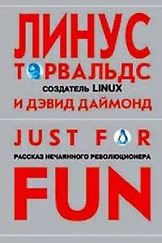Linus Torvalds - Just for Fun
Здесь есть возможность читать онлайн «Linus Torvalds - Just for Fun» весь текст электронной книги совершенно бесплатно (целиком полную версию без сокращений). В некоторых случаях можно слушать аудио, скачать через торрент в формате fb2 и присутствует краткое содержание. Город: NewYork, Год выпуска: 2001, ISBN: 2001, Издательство: HarperCollins Publishers, lnc., Жанр: Программирование, на английском языке. Описание произведения, (предисловие) а так же отзывы посетителей доступны на портале библиотеки ЛибКат.
- Название:Just for Fun
- Автор:
- Издательство:HarperCollins Publishers, lnc.
- Жанр:
- Год:2001
- Город:NewYork
- ISBN:0-06-662072-4
- Рейтинг книги:4 / 5. Голосов: 2
-
Избранное:Добавить в избранное
- Отзывы:
-
Ваша оценка:
- 80
- 1
- 2
- 3
- 4
- 5
Just for Fun: краткое содержание, описание и аннотация
Предлагаем к чтению аннотацию, описание, краткое содержание или предисловие (зависит от того, что написал сам автор книги «Just for Fun»). Если вы не нашли необходимую информацию о книге — напишите в комментариях, мы постараемся отыскать её.
Just for Fun — читать онлайн бесплатно полную книгу (весь текст) целиком
Ниже представлен текст книги, разбитый по страницам. Система сохранения места последней прочитанной страницы, позволяет с удобством читать онлайн бесплатно книгу «Just for Fun», без необходимости каждый раз заново искать на чём Вы остановились. Поставьте закладку, и сможете в любой момент перейти на страницу, на которой закончили чтение.
Интервал:
Закладка:
There's the notion of "fork," which is one of the fundamental Unix operations. When a process does a fork, it creates a complete copy of itself. That way, you have two copies that are the same. The child copy most often ends up executing another process-replacing itself with a new program. And that's the second basic operation. Then you have four other basic system calls: open, close, read, and write -- all designed to access files. Those six system calls make up the simple operations that comprise Unix.
Sure, there are tons of other system calls to fill in all the details. But once you understand the six basic ones, you understand Unix. Because one of the beauties of Unix is realizing that you don't need to have complex interfaces to build up something complex. You can build up any amount of complexity from the interactions of simple things. What you do is create channels of communication (called "pipes" in Unix-speak) between simple processes to create complex problem-solving.
An ugly system is one in which there are special interfaces for everything you want to do. Unix is the opposite. It gives you the building blocks that are sufficient for doing everything. That's what having a clean design is all about.
It's the same thing with languages. The English language has twenty-six letters and you can build up everything from those letters. Or you have the Chinese language, in which you have one letter for every single thing you can think of. In Chinese, you start off with complexity, and you can combine complexity in limited ways. That's more of the VMS approach, to have complex things that have interesting meanings but can't be used in any other way. It's also the Windows approach.
Unix, on the other hand, comes with a small-is-beautiful philosophy. It has a small set of simple basic building blocks that can be combined into something that allows for infinite complexity of expression.
This, by the way,is also how physics works. You try and find the fundamental rules that are supposed to be fairly simple. The complexity comes from the many incredible interactions you get from those simple rules, not from any inherent complexity of the rules themselves.
The simplicity of Unix did not just happen on its own. Unix, with its notion of simple building blocks, was painstakingly designed and written by Dennis Richie and Ken Thompson at AT&T's Bell Labs. And you should absolutely not dismiss simplicity for something easy. It takes design and good taste to be simple.
To go back to the example of human languages: Pictorial writing like Chinese characters and hieroglyphics tend to happen first, and be "simpler," whereas the building block approach requires far more abstract thinking. In the same way, you should not confuse the simplicity of Unix with a lack of sophistication -- quite the reverse.
Which is not to say that the original reasons for Unix were all that sophisticated. Like so many other things in computers, it was all about games. It took somebody who wanted to play computer games on a PDP-II. Because that was what UNIX started out being developed for-Dennis and Ken's personal project for playing Space Wars. And because the operating system wasn't considered a serious project, AT&T didn't think of it as a commercial venture. In fact, AT&T was a regulated monopoly, and one of the things they couldn't do was to sell computers anyway. So the people who created Unix made it available quite freely along with source licenses, especially to universities. It wasn't a big deal.
This all led to Unix becoming a big project in academic circles. By the time of the 1984 breakup, when AT&T was finally allowed to get into the computer business, computer scientists at universities-particularly the University of California-Berkeley had been working on and improving Unix for years under the direction of people like Bill Joy and Marshall Kirk McKusik. People hadn't always necessarily put a lot of effort into documenting what they did.
But by the early 1990s, Unix had become the number-one operating system for all supercomputers and servers. It was huge business. One of the problems was that there were, by now, a host of competing versions of the operating system. Some were derived from the more controlled confines of the AT&T code base (the so-called "System V" flavors), while others were derived from the University of California-Berkeley code-base BSD (Berkeley Software Distribution). Yet others were a mixture of the two.
One BSD derivation in particular is worth mentioning. It was the 386BSD project done by Bill Jolitz based on the BSD code-base, distributed over the Internet. It was later to fragment and become the freely available BSD flavors -- NetBSD, FreeBSD, and OpenBSD -- and it was getting a lot of attention in the Unix community.
That's why AT&T woke up and sued the University of California-Berkeley. The original code had been AT&T's but most of the subsequent work had been done at Berkeley. The University of California regents contended that they had the right to distribute, or sell for a nominal fee, their version of Unix. And they demonstrated that they had done so much work that they essentially rewrote what AT&T had made available. The suit ended up being settled after Novell, Inc., bought Unix from AT&T. Essentially, parts of the system had to be excised from what AT&T had made available.
Meanwhile, all the legal haggling had been instrumental in giving a new kid on the block some time to mature and spread itself. Basically, it gave Linux time to take over the market. But I'm getting ahead of myself.
Since I'm digressing anyway, I'd like to explain something. Unix has this reputation for being a magnet for the eccentric fringe of computing. It's a reputation not worth arguing against. It's true.
Frankly, there are a lot of fairly crazy people in Unix. Not postal-rage crazy. Not poison-the-neighbor's-dog crazy. Just very alternative-lifestyle people.
Remember, much of the initial Unix activity took place in the late 1960s and early 1970s, while I was sleeping in a laundry basket in my grandparents' apartment. These were flower power people -- but technical flower power people. A lot of the Unix-must-be-free philosophy has more to do with the circumstances of the time rather than with the operating system. It was a time of rampant idealism. Revolution. Freedom from authority. Free love (which I missed out on, and probably wouldn't have known what to do with, anyway). And the relative openness of Unix, even if it was mainly due to the lack of commercial interests of the time, made it attractive to this kind of person.
The first time I was introduced to this side of Unix was probably in 1991 or so when Lars Wirzenius dragged me along to an event at the Polytechnic University of Helsinki (which, as everybody knows, is not actually in Helsinki but right across the border in Espoo). They just want to be associated with the glamorous Helsinki even if only by name). The speaker was Richard Stallman.
Richard Stallman is the God of Free Software. He started to work on an alternative to Unix in 1984, calling it the GNU system. GNU stands for "GNU is Not Unix," being one of many recursive acronyms where one of the letters stands for the acronym itself -- a kind of computer science in-joke that nobody else ever gets. Geeks -- we're just tons of fun to be around.
More importantly, RMS, as he prefers to be called, also wrote the Free Software Manifesto, and the Free Software copyright license -- the GPL (General Public License). Basically, he pioneered the notion of free source-code availability as something intentional, not just an accident, the way it happened with original Unix open development.
I have to admit that I wasn't much aware of the sociopolitical issues that were -- and are --so dear to RMS. I was not really all that aware of the Free Software Foundation, which he founded, and all that it stood for. Judging from the fact that I don't remember much about the talk back in 1991, it probably didn't make a huge impact on my life at that point. I was interested in the technology, not the politics-I had had enough politics at home. But Lars was an ideologist, and I tagged along and listened.
Читать дальшеИнтервал:
Закладка:
Похожие книги на «Just for Fun»
Представляем Вашему вниманию похожие книги на «Just for Fun» списком для выбора. Мы отобрали схожую по названию и смыслу литературу в надежде предоставить читателям больше вариантов отыскать новые, интересные, ещё непрочитанные произведения.
Обсуждение, отзывы о книге «Just for Fun» и просто собственные мнения читателей. Оставьте ваши комментарии, напишите, что Вы думаете о произведении, его смысле или главных героях. Укажите что конкретно понравилось, а что нет, и почему Вы так считаете.












